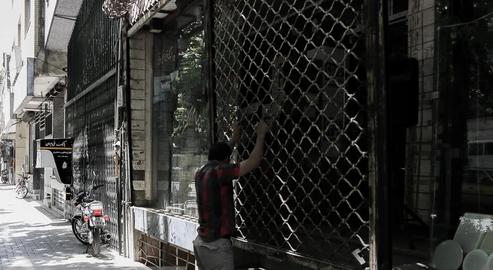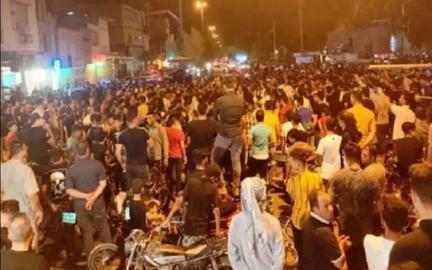Households and businesses across Iran continue to be blighted by both power outages and water shortages, all at the height of summer. A newly-published article in the Iranian police-affiliated quarterly Resource Management in Security Forces predicts that this dismal state of affairs could continue for some time yet.
Water shortages have been a perennial problem in Iran for years. But they are becoming more severe, and are now accompanied by blackouts that double the suffering of ordinary people. In response, Iranian officials have rationed water and electricity use, and called on people to conserve energy.
The long-term solutions are within the state’s power to implement. But the new study in the police-aligned journal declared that both international sanctions and managerial inefficiencies played a pivotal role in exacerbating the crisis.
Financial Pressures on Iran’s Electricity Industry
For the article, entitled Designing Governance Mechanisms in the face of Sanctions, researchers spoke to 15 industry experts about the state of Iran's electricity network. One of the biggest issues, they were told, was the dire state of Iran’s economy and the impact of sanctions on power providers’ revenue and expenditure – but so too was a “non-economical approach” toward their management.
In recent years, the interviewees said, Iran’s electricity industry has dealt with “reduced exports of technical and engineering services", "reduced foreign investment" and "reduced exports of goods and electrical equipment".
On the other hand, the financial costs of importing the necessary equipment to maintain and improve the system had soared. Meanwhile, the report’s authors were told, the system was adversely affected by a “lack of professional behavior in international projects" and a "lack of cooperation and synergy between companies”.
Before the reimposition of sanctions, they said, Iranian executives and engineers could make use of training courses abroad. In the past few years Iran has been deprived of access to the latest insight and technological developments.
Increased Demand and Non-Coordination Putting System Under Strain
The changing commercial climate inside Iran was also blamed for the inefficiencies of Iran’s electricity sector. The study’s participants noted a growth in domestic electricity consumption, by both households and businesses, at a time when the system had been hampered by “inefficient privatization”, a "budget deficit" and the "incomplete meeting of standards” making the market less competitive. The rising costs of industrial projects – and associated delays – were also placing extra demand on the system, they said.
Structural issues including a “lack of coordination” between the Ministries of Oil and Energy were also raised. Both ministries, the report said, were not supplying firms with enough capital to maintain and update their facilities.
Then there were the so-called “cultural” factors. Apart from a lack of up-to-date knowledge, software and training, the experts said, the industry was not being well-managed due to a “reduction in regional communications” and crucially a “lack of foreign supervisors”.
First Steps to Recovery: End Sanctions and Subsidize
The most important means of bringing about an end to Iran’s ceaseless blackouts, the study suggested, would be finding a way to end the crippling sanctions on Iran’s commercial sector. In the meantime, they said, authorities could modify the system of subsidies to allow consumers to buy more, and simultaneously try to trade Iranian natural gas for supplies of electricity from other countries.
Earlier, the Iranian Parliamentary Research Center had issued an official report stating that the failure of the JCPOA and the escalation of sanctions had caused significant damage to Iran's electricity industry on two fronts. Researchers at the Center, which comes under the Office of the President, wrote that sanctions had exacerbated the challenges of obtaining raw materials and equipment for the electricity industry on the one hand, and made it impossible to collect revenues from exports on the other.
"During the sanctions,” the Center wrote, “the challenges of procuring the required materials increased costs and, consequently, the final price for consumers.” It also listed a slew of related issues including the “impossibility” of issuing bank guarantees, paying for raw materials or issuing visas for foreign experts, adding that sanctions had brought a halt to technology transfer agreements with European and Asian countries.
Last year, the Iranian Institute for Business Studies and Research had also published a report stating that sanctions had “hampered the development of Iran's electricity export markets” by increasing the perceived risk, reducing foreign companies’ willingness to do business with Iran.
Related coverage:
What Role has Ayatollah Khamenei Played in Iran's Blackouts?
Ruined Bread to Pitch-Black Hospital Wards: Iranians' Fury at Power Outages
Industries at Risk as Bitcoin Mining Brings Blackouts to Iranian Cities
Blackouts in Iran: Why is the Electricity Deficit So High This Summer?
Dispatch from Tehran: Blackouts Leading to Bankruptcy
Water Tariffs to Increase in Iran Ahead of Summer Shortages
Fact File: Did Bitcoin Mining Lead to Blackouts in Iran?
Coronavirus in Iran: Power Outages, Black Fungus, and Warnings of a Fifth Surge
visit the accountability section
In this section of Iran Wire, you can contact the officials and launch your campaign for various problems


























comments